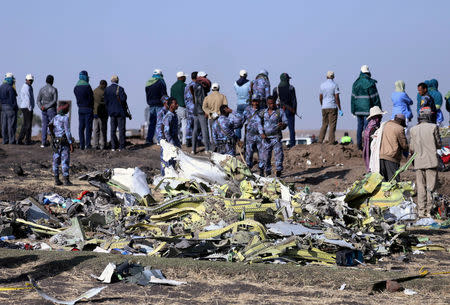Factbox: What we know about Boeing 737 MAX crashes and what comes next

(Reuters) - More than 300 Boeing 737 MAX jets have been grounded worldwide after two fatal crashes in five months in Ethiopia and Indonesia killed nearly 350 people.
Investigators looking to uncover the causes must answer one of the biggest questions: Was the plane's software to blame?
WHAT WE KNOW
- Boeing has stopped delivery of all new MAX jets. Its stock has fallen about 9 percent since the Ethiopian Airlines crash on March 10.
- Boeing maintains its new, fuel-efficient jets are safe, but supported the U.S. Federal Aviation Administration (FAA) decision to ground them.
- Outlining the findings of a preliminary report into the Ethiopian crash, investigators on April 4 urged Boeing to review its flight control technology and said the crew had carried out the correct procedures. Safety experts said the report may trigger a debate over crew actions and technology.
- The pilots wrestled with controls to stay aloft but plunged to the ground after restoring current to a computer system that was ordering the nose down because of faulty sensor data, a preliminary report showed on April 4.
- The preliminary report into October's Lion Air crash said on Nov. 28 that pilots reported a "flight control problem." It also focussed on airline maintenance and training.
- Sources told Reuters on March 18 that investigators had found similarities in the 'angle of attack' data from both the Ethiopian and Indonesian flights.
- Sources said on March 21 that Boeing would mandate on MAX jets a previously optional cockpit warning light, which might have warned of problems that possibly played a role in both crashes.
- Experts believe a new flight control system, MCAS, on the jets, designed to stop stalling by dipping the nose, may have been a factor in both accidents, with pilots unable to override it as their jets plunged after a faulty sensor indicated a stall. But no conclusive evidence yet links the two accidents.
- The MCAS system on the Ethiopian flight re-engaged as many as four times after the crew initially turned it off, two people familiar with the matter told Reuters on April 3.
- Boeing said on April 3 it had successfully tested an update of the MCAS system.
- The U.S. Federal Aviation Administration said on April 3 it was launching a new review of the 737 MAX.
- Europe and Canada said on March 20 they would independently certify the safety of the jets, further complicating plans to get the aircraft back flying.
- Indonesia's flag carrier Garuda said on March 22 it had sent a letter to Boeing asking to cancel an order for 49 MAX 8 aircraft, becoming the first airline to confirm plans to cancel an order after the crashes.
WHAT'S NEXT?
- Indonesia has advanced the planned release of its report on the Lion Air crash to between July and August, versus a previous schedule of between August and September.
- U.S. lawmakers said on March 14 the 737 MAX could be grounded for weeks to upgrade software in every plane. Other countries may ground the planes even longer.
- The U.S. Transportation Department's inspector general plans to audit the FAA's certification of the jet, an official with the office said on March 19. The office can recommend changes or improvements to how the FAA operates.
- The U.S. Justice Department is also looking at the FAA's oversight of Boeing, a person familiar with the matter has said. The FAA has said it is "absolutely" confident in its vetting.
- The chairman of the U.S. House of Representatives transportation committee and another key Democrat asked the Transportation Department's inspector general to examine key decisions the FAA made in certifying the MAX jet.
- U.S. President Donald Trump will nominate former Delta Air Lines executive Steve Dickson to head the FAA, the White House said on March 19.
- Ethiopian Airlines said on March 16 that DNA testing of passengers' remains may take up to six months.
(Compiled by Reuters bureaux)

